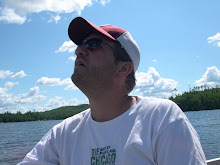
Well, we met today with Dr. Arthur (Art) Coffey of Clarian Health. I found his name the old-fashioned way: Google search. After learning about the Cleveland Clinic and the many benefits of minimally invasive surgery (less time in the hospital, less recovery time, reduced chance of infection, etc), I tried to find a local surgeon who could do it. Let's just say that the Cleveland Clinic does a MUCH better job with their marketing and search engine optimization than the hospitals in Indianapolis. It took me a while to figure out who's doing what here in town.
Dr. C was the first in Indiana to perform the minimally invasive mitral valve repair surgery (2005). My cardiologist (Dr. McHenry) had referred me to Dr. Mark Turrentine, who couldn't get me in for a few weeks. Juli called Dr. C's office out of the blue and was able to get me an appointment in two days.
After looking at my records, Dr. C indicated that I was NOT a candidate for the minimally invasive procedure. His blunt words kicked me in my gut pretty hard, but I did manage to keep from bursting into tears on the spot. I'm going to be fine, I thought to myself, it's just going to be more complicated than I had hoped.
I have an enlarged ventricle due to the strain the muscle has been under as a result of the prolapse. I also have an enlarged atrium (both left). The enlargement is the body's way of trying to compensate for the problem. The left ventricle, believe it or not, will probably shrink after surgery. The body is an amazing machine. The atrium, however, will not shrink. But that's normal.
Dr. C describe the mitral valve like a parachute cut in half. The pressure of blood in the ventricle causes the "parachutes" to close, preventing leakage of blood back into the atrium. These parachutes are called leaflets. During the previous moment of the cardiac cycle, the parachute halves are open and the oxygenated blood in the atrium flows into the ventricle. A beautiful design. However, my valve doesn't close back up and blood leaks (regurgitates) back into the left atrium. Pretty severely. The parachute analogy works pretty well because there are also several cords (chordae tendineae) that anchor the mitral valve to the left ventricle. The surgeon will attach my repaired valve with cords made of Gortex. Pretty cool. He says they will outlast me. I think that's a comment about how long the cords last, not how long I'm going to last. :)
One of the other factors that makes this procedure more complicated is that I have some excess tissue on the valve that needs to be removed.
Given all that has to be done, it rules me out for the minimally invasive procedure. He said that if he did hundreds of these a year he might do it, but he doesn't. The CC, which does do hundreds of these every year, may or may not recommend minimally invasive. Don't know yet.
I asked about pain after the procedure and he said, believe it or not, the people who have the worst time with pain are young men (lucky 37-year-old me). He also said, as counter-intuitive as it may seem, that "little old ladies" have the least pain.
Another thing that Dr. C recommended is that I have a heart cath. According to WebMD, "Cardiac catheterization is a test to check your heart and coronary arteries. It is used to check blood flow in the coronary arteries, blood flow and blood pressure in the chambers of the heart, find out how well the heart valves work, and check for defects in the way the wall of the heart moves...the purpose is to find out if you have disease in your coronary arteries (atherosclerosis). If you have atherosclerosis, this test can pinpoint the size and location of fat and calcium deposits that are narrowing your coronary arteries."
If they find I have blockages, they will address that during my mitral valve surgery. Hey, they may as well fix everything while they have me cracked open. They are doing this test as a preventive measure. My dad had his first heart attack when he was around 60, so my chances of having a problem are increased because of my family history. Let's hope that history doesn't repeat itself in this case. But better safe than sorry.
One of the last questions I asked was whether or not I'll be able to return to normal physical activities after the surgery. Dr. C said that after three months I will be able to do everything I could do before (e.g. skiing). The muscle and bone mend and heal. Incredible. But I'm sure I'll still want to take it easy. Note to self: become a better skier so I don't fall down so much.

No comments:
Post a Comment